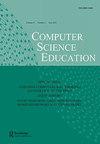Assessing individual contributions to software engineering projects: a replication study
IF 2.2
Q1 EDUCATION & EDUCATIONAL RESEARCH
引用次数: 2
Abstract
ABSTRACT Background and Context Assessing team members’ indivdiual contributions to software development projects poses a key problem for computing instructors. While instructors typically rely on subjective assessments, objective assessments could provide a more robust picture. To explore this possibility, In a 2020 paper, Buffardi presented a correlational analysis of objective metrics and subjective metrics in an advanced software engineering project course (n= 41 students and 10 teams), finding only two significant correlations. Objective To explore the robustness of Buffardi’s findings and gain further insight, we conducted a larger scale replication of the Buffardi study (n = 118 students and 25 teams) in three courses at three institutions. Method We collected the same data as in the Buffardi study and computed the same measures from those data. We replicated Buffardi’s exploratory, correlational and regression analyses of objective and subjective measures. Findings While replicating four of Buffardi’s five significant correlational findings and partially replicating the findings of Buffardi’s regression analyses, our results go beyond those of Buffardi by identifying eight additional significant correlations. Implications In contrast to Buffardi’s study, our larger scale study suggests that subjective and objective measures of individual performance in team software development projects can be fruitfully combined to provide consistent and complementary assessments of individual performance.评估个人对软件工程项目的贡献:一项复制研究
评估团队成员对软件开发项目的个人贡献是计算机教师面临的一个关键问题。虽然教师通常依赖于主观评估,但客观评估可以提供更可靠的画面。为了探索这种可能性,在2020年的一篇论文中,Buffardi在一门高级软件工程项目课程(n= 41名学生和10个团队)中对客观度量和主观度量进行了相关分析,发现只有两个显著的相关性。为了探索Buffardi研究结果的稳健性并获得进一步的见解,我们在三所院校的三门课程中对Buffardi研究进行了更大规模的复制(n = 118名学生和25个团队)。方法收集与Buffardi研究相同的数据,并根据这些数据计算相同的测量值。我们重复了Buffardi对客观和主观测量的探索性、相关性和回归分析。在重复了Buffardi的5个重要相关发现中的4个,部分重复了Buffardi的回归分析结果的同时,我们的结果超越了Buffardi的结果,确定了另外8个重要的相关性。与Buffardi的研究相反,我们更大规模的研究表明,团队软件开发项目中个人绩效的主观和客观度量可以有效地结合起来,以提供一致和互补的个人绩效评估。
本文章由计算机程序翻译,如有差异,请以英文原文为准。
求助全文
约1分钟内获得全文
求助全文
来源期刊

Computer Science Education
EDUCATION & EDUCATIONAL RESEARCH-
CiteScore
6.90
自引率
3.70%
发文量
23
期刊介绍:
Computer Science Education publishes high-quality papers with a specific focus on teaching and learning within the computing discipline. The journal seeks novel contributions that are accessible and of interest to researchers and practitioners alike. We invite work with learners of all ages and across both classroom and out-of-classroom learning contexts.
 求助内容:
求助内容: 应助结果提醒方式:
应助结果提醒方式:


